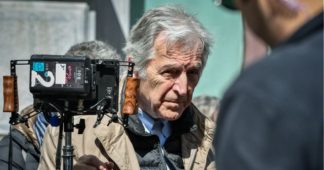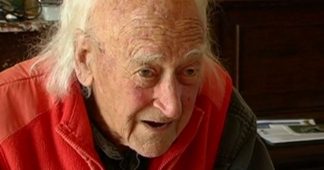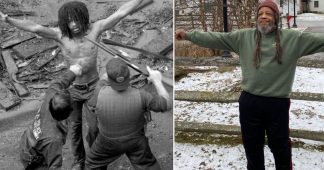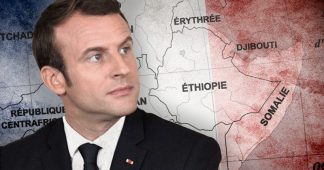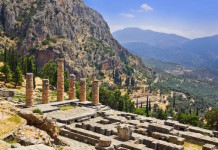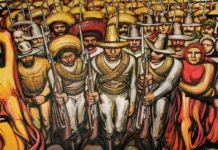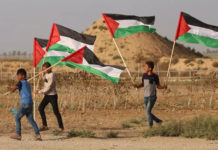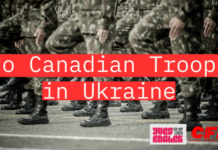05/24/2020
Africa has been torn apart by internecine wars and conflicts throughout its post-colonial period of history, and the bloody history of the continent has naturally drawn the attention of many artists and directors.
Unfortunately, most of the war movies where action takes place in Africa were shot from the perspective of white outsiders interested in catching a glimpse into the exotic continent. However, the various peoples of Africa have their own dignity and vision of truth, and cinema has been one medium of expressing it.
We have chosen films that reflect the perceptions of Africa, both by Africans themselves and by external observers, including former colonial masters of the continent. This selection deliberately includes intellectual dramas, action movies, and even some truly trashy films which are nonetheless unique and illustrate important historical and sociological trends.
1. 15 Minutes of War (L’Intervention) – France, 2019
In 1976, rebels hijack a school bus with 21 French pupils and an American teacher and take it to a neutral zone on the border between the French colony of Djibouti and Somalia. A French captain is assigned to lead a team of snipers to quickly rescue the hostages. When negotiations fail, these snipers are the only ones who can save their lives.
The hostage rescue team later became the backbone of GIGN (Le Groupe d’intervention de la gendarmerie nationale), a special unit dedicated to fighting terrorism and hostage rescue.
This is perhaps the best film about conflict in Africa made in recent years in France, and so far the best French film about snipers. The film is attentive to certain psychological aspects of the conflict, but also the harsh truth of war.
Based on real events, it impresses with a meticulous restoration of the era. At the same time, this film is not free from French colonial prejudices. The film’s villains position themselves as freedom fighters and want the French colonists to leave their land, but the depth of their motivation is not revealed. For the viewer, they are a collection of moral freaks that threaten the lives of children.
2. “Wild geese” – UK, Switzerland, 1978
An English industrialist named Matterson hires an experienced mercenary, Colonel Faulkner, to plan and execute the release of the deposed president of an African country and bring him to London to organize a coup d’état and bring the president to power.
Matterson is driven by his vested interests – there are large deposits of copper on the territory of this state and Mutterson wants to take them to the hands. Faulkner agrees, recruits people, plans and carries out this operation, but as it turns out, their employer has betrayed them and now the mercenaries have only to try to break through at the border of the neighboring state.
This is a classic film about European mercenaries in Africa. It is fictional, but Faulkner was based on the legendary Mike Hoar, who was a consultant to the film.
3. “Dark of the Sun” (The Mercenaries) – the USA, 1968
One of Quentin Tarantino and Martin Scorsese’s favorite films. The movie tells the story of an episode of the civil war in Congo, at the time a Belgian colony divided into two countries: the Democratic Republic of Congo and the secessionist province of Katanga with its copper mines.
The movie is far from politically correct: it shows the bloody rampage of the black tribe, or rather, a mass of people united not even by tribal bonds, but rather by a primitive pagan cult of lions.
The film is laden with blood and murder by bayonet, machine gun and even a chainsaw.
4. The Siege of Jadotville – Ireland-South Africa, 2016
Another look at the history of the Congo and the separatism of Katanga, mercenaries and the role of mining corporations in Africa. The film is based on real events in 1961.
Following the declaration of the independence of the Belgian colony of Congo, field commander Moïse Tshombe announces the separation of the mineral-rich province of Katanga, and the formation of the independent state of Katanga. Chombe’s actions are directed and supported by the Belgians, former owners of mines in Katanga. The UN does not recognize Katanga and sends its armed forces to the province.
An Irish army company from the UN forces is tasked with guarding an uranium mine near the town of Jadotville. Wanting to regain control of the mine, the former owners come into contact with Tshombe, who sends a unit of the so-called Katanga gendarmerie and a group of mercenaries to Jadoville.
The mercenary commander, a French war veteran in Indochina with extensive combat experience, offers a deal to the Irish commander, but the Irish rejects it.
The film won three Irish Academy Awards for Best Director, Best Supporting Actor and Best Visual Effects.
5. Night of Truth (La nuit de la vérité) – Burkina Faso, 2004
If for Europeans, war in Africa takes the form of an exotic adventure, then for Africans, it comes by way of serious pain and personal experience.
After ten years of disastrous civil war, a peace treaty will be signed between the Nayaks (the President’s ethnic group) and Bonandés (rebels grouped around Colonel Theo). Around the ethnic conflict Fanta Régina Nacro wanted to arrange a Shakespearean drama. Many things in the film may seem grotesque or exaggerated, but one of the wildest scenes – roasting a man at the bonfire – is not fictional, and was actually the method of execution for the director’s uncle.
6. Beast of No Nation – the USA, 2015.
There’s a civil war going on in a West African country. Agu stays in his village with his father, older brother and grandfather, while his mother, sister and younger brother flee to the capital. The village is taken over by the army and all the men are killed except Agu, who manages to escape. Soon he is captured by the rebels, and they force him to fight on their side under the threat of death.
Based on the novel by the American writer of Nigerian origin Uzodinma Chukuka Iweala, the film addresses the phenomenon of child soldiers, transformation of a child into a killing machine, initiation and sense of masculinity, war and childhood.
The director was Cary Joji Fukunaga, who received an Emmy Award for the first season of “True Detective”. One of the main roles in the film was Idris Elba.
The film won two prizes at the Venice Festival 2015: the Marcello Mastroianni Award (Abraham Atta) and the CICT-UNESCO Enrico Fulchignoni Award (Cary Fukunaga).
7. Sometimes in April – USA-France-Rwanda, 2005
One of the best films covering the genocide in Rwanda, featuring Idris Elba.
In April 1994, Rwandan Army Captain Augustin Muganza of the Hutu nationality lost his Tutsi wife and children in the genocide. Ten years later, in April 2004, he receives a letter from his brother Honoré, who was then a well-known radio host, who claims to know the details of the tragedy. Augustin goes to Tanzania, where his brother is brought before a tribunal for inciting hatred while working on the radio. A former military man, now a teacher, faces the events of what he has experienced.
The film won the prize for best film at the festival in Durban and the prize for best television program of the year. The film contains brutal scenes of violence.
8. Black Hawk Down – USA, 2001
One of Ridley Scott’s best films, Black Hawk Down tells the story of the American military intervention in Somalia in the mid-1990s. The movie won two Oscar awards for editing and best sound. The plot is based on the real events of October 3-4, 1993. Performing the mission to arrest and capture two members of the so-called “government of the Somali National Alliance”, US Special Forces units engaged in urban warfare with the enemy with multiple numerical superiority and according to American estimates suffered heavy losses – 19 people. This event influenced the US decision to withdraw its troops from Somalia.
Despite the fact that the number of Americans who died were far less than the number of Somalis, this event was considered a defeat for the United States.
The cinematography of the film is top-notch… However, as is often the case with American movies, the portrayal of the locals is far from the truth.
Somalis pointed out that the African actors chosen for the role of the Somalis in the film are nothing like the real inhabitants of the country, and even the language they speak is not like any of the African languages spoken by Somalis. The film, with its crude narrative and misguided vision of Somali culture, fails to convey the nature, characteristics and spirit of real life in Somalia. At a film screening in Somalia, young people loudly cheered when an American soldier was shot.
9. The Red Scorpion – USA, 1988
A curious example of cinematic propaganda from the end of the Cold War and the reign of Ronald Reagan. The film is something like “Rembo” with an African entourage. Dolph Lungren plays Soviet special forces officer Nikolai Rachenko, who decides to betray his country and work with pro-American rebels.
The movie has everything you need for action movies from the 1980s: chases, shooting and Dolph Lungren’s bulging muscles.
Some scenes of the film were shot in Namibia, which was then occupied by the apartheid regime in South Africa, so the film was negatively received by anti-apartheid fighters. It was believed, not without reason, that it was created with the money of the South African apartheid leadership to undermine the African National Congress, which was supported by the USSR and socialist countries.
The film is an important reminder of who the US supported during the Cold War.
10. Who Killed Captain Alex? – Uganda, 2010
A film that is so bad, it’s actually good. A unique low-budget film by non-professional Ugandan director Nabwana Isaac Geoffrey Godfrey, who has been called Uganda’s Tarantino. The movie was made for less than $200 and was shot in the slums of Uganda’s capital Kampala with non-professional actors and non-professional editing.
The film contains absolutely all the stamps of action movies with African flavor, including the Shaolin monk of Uganda and “Tiger Mafia”. As a child, Nabwana Isaac Geoffrey Godfrey loved action movies, but didn’t actually have the opportunity to watch them, instead learning about their content and tropes from other children.
